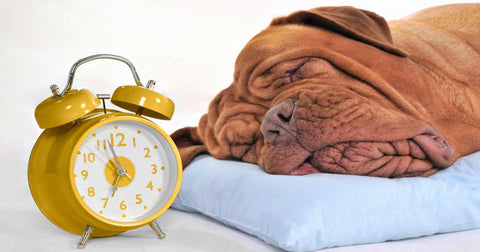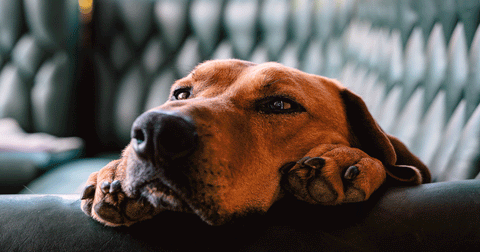Not so long ago we talked about how the clocks changing in Autumn could affect your dog and you might think that the clocks going forward on the 28th of March will have the same effect but actually this time, it can be more difficult for your dog to adjust.

How Will The Clocks Changing Affect my Dog’s Behaviour?
It comes as no surprise that dogs thrive on a routine and dogs are no different to humans when it comes to their biological clocks. Also known as a circadian rhythm, their bodies tell them when it is time to eat, sleep, wake up and potty.
However, the difference for us, is that we know the change is approaching but our dogs are clueless and this change can be unexpected and challenging.
They may be thinking, “why am up so early?” or “why is it dark outside?”.

To enable us to make the most of the daylight hours, the Daylight Saving Time makes it lighter in the evenings and darker in the mornings. Since dogs tend to wake up when the sun rises and fall asleep after sunset, waking up when it’s still dark outside can be very confusing.
This abrupt transition is what makes dogs anxious. Their meals are now served at a different time, they are let out earlier to go potty and walks are rescheduled. A change in your dog’s schedule can trigger stress and anxiety and on the rare occasion, your dog might even have an accident indoors because their bladders haven’t learnt the new schedule yet. Trouble sleeping is also a concern because they might not be tired when you put them to bed.
How to Help Your Dog Adjust To The Clocks Changing
It is actually easier than you think - introduce the new schedule in your dog’s routine slowly. The clocks will go forward on Sunday morning at 1am and just altering your dog’s routine a couple of days prior to this event will help them transition to the new schedule and avoid any triggers that lead to anxiety and stress.
Changing their routine by 15-20 minutes every day will give your dog enough time to transition to the new schedule and hopefully they won’t notice at all. However, if your dog does struggle with the change and has difficulty sleeping, we offer a variety of supplements like YuCALM and calming dog treats to help with stressed behaviour. Always ask your veterinarian first before introducing supplements into your dog’s diet.
Alternatively, if your dog is not sleeping throughout the night, more playtime and longer walks can help improve their sleep because they will feel more tired in the evenings.
Not all dogs will find the clocks changing difficult but is it important to keep in mind that an altered schedule can cause confusion and stress in dogs. As long as you put in the time and be consistent in making the transfer, your dog will adjust to their new routine in no time!




Comments (0)
There are no comments for this article. Be the first one to leave a message!